- Home
- Beryl Kingston
Tuppenny Times Page 3
Tuppenny Times Read online
Page 3
The book fell open at exactly the right page, as well it might, since that was where it was always opened, and Nan settled herself on a stool at her mistress’s feet and began to read.
‘My good Pamela, be virtuous, and keep the men at a distance. So I was, I hope, and so I did; and yet, though I say it, they all loved me, and respected me, and would do any thing for me, as if I was a gentlewoman. But then, what comes next? Why, it pleases God to take my good lady; and then comes my master: and what says he? Why, in effect it is: “Be not virtuous, Pamela.”’
Keep the men at a distance, she thought, as Mrs Howkins made purring noises of agreement and pleasurable anticipation. I done that last night and no mistake. And a sight more effective than that silly Pamela.
‘I must renounce all the good, all the whole sixteen years’ innocence, which, next to God’s grace, I owed chiefly to my parents, and my lady’s good lessons and examples, and choose the evil; so, in a moment’s time, become the vilest of creatures! All this for what, I pray? Why truly, for a pair of diamond ear-rings, a necklace and a diamond ring for my finger.’
‘Ah!’ Mrs Howkins sighed again, twisting the pearl on her own finger.
If a rich man was to offer me jewels, Nan thought, I know what I’d do right enough. I’d take un. ’T would be a wicked waste otherwise. Except I’d get un to marry me first. If he loved me enough to offer me jewels, I reckon he could love me enough to put a wedding ring on my finger.
‘Read on, my dear,’ Mrs Howkins said, closing her eyes and turning her best ear towards her servant. So Nan read and her mistress was soothed as Pamela struggled yet again to preserve her well-tried virginity.
‘Now,’ Mrs Howkins said when the tale was done. ‘You shall tell me all about last night’s adventure. Every last detail. I feel well enough to withstand it this morning.’
She withstood it with great enjoyment, squeaking at the sailors’ violence, sighing at Mr Easter’s gallantry, snorting at her husband’s hypocrisy.
‘You shall have a new bodice, my dear,’ she promised, ‘and a new cap with cherry ribbons and a fresh lining to your cloak. And I will write to Mr Easter this very afternoon to let him know how grateful we all are. A fine man, Mr Easter, from a fine family. They own a deal of property hereabouts. A very fine family.’
So the letter was written and sent around by Mr Howkins’ clerk, who returned with a billet from Mr Easter to say he was charmed to have been of service, and that he hoped the little maid had taken no harm from her experiences and that the calves’-foot jelly he had sent had been received and enjoyed.
‘Oh yes ma’am,’ Nan assured her mistress when she was questioned about it. ‘Very enjoyable that were.’ Abby had said as much. Several times.
‘You must be sure to thank the gentleman properly the very next time we see him,’ Mrs Howkins ordered.
They saw him on Sunday when they were promenading in Market Square after morning service in St Nicholas’ church. He was strolling towards them, deep in thought, with his hands clasped behind his back under his coat tails. They were almost toe-to-toe before he looked up, but then he greeted them most courteously, raising his brown beaver hat and smiling shyly. There was such a gentleness about him, Nan thought, and his face was every bit as kind as she remembered it, a nice, round, honest face with a firm chin and cheeks as pink as a baby’s and a funny little button-nose, and really quite handsome blue eyes. He must have been quite presentable when he was young.
She bobbed him a curtsey and thanked him politely for the jelly she hadn’t eaten, and Mrs Howkins talked to him at length about the unruly nature of the seafaring profession and declared herself ‘wild with relief’ that those three awful ships had gathered together the remnants of their awful crews and sailed away to torment someone else.
The next morning Matthew arrived in Plum Row with a box full of sugared almonds, ‘for the little maid’.
‘You’ve took someone’s eye an’ no mistake,’ Cook said, ‘but whether ’tis the master’s or the man’s that en’t for me to say!’
‘Load a’ squit!’ Nan said, handing round the sweetmeats and trying to keep her head down because she could feel a blush warming her cheeks. But she was beginning to wonder.
‘She’s turnin’ red!’ Abby said, delighted. ‘Our Nan’s a-turnin’ red!’
‘Have an almond,’ Nan said. ‘Take a big un.’ Least she couldn’t say nothing with her mouth full.
William Henry Easter was wondering at himself. It was most unlike him to take such an active interest in anybody, yet he had to admit that this child fascinated him. It wasn’t that she was particularly pretty. Her face was too narrow for beauty, and her mouth too wide, and her eyebrows too thick, more like a boy’s, if the truth be told. But she had such an abundance of energy, and such a straight determined walk, and such splendid dark eyes. A bewitching child.
Sunday slowly became the favourite day of his week. He would dress for his promenade with extra care, hoping to be greeted by a gush of gossip from Mrs Howkins and rewarded by the chance to tease little Nan. Occasionally, when Mr Howkins decided to accompany his wife, the outing was a disappointment, for then the little maid stood to one side and said nothing. But on most Sundays he managed to exchange pleasantries, and sometimes he provoked her to a witty rejoinder. A bewitching child.
At the end of April he found it necessary to visit London for a week or two and attend to his business there. When he came back the child had evidently taken a chill. He sent Matthew round at once with a little dish of candied fruits. And to his delight and astonishment, the little minx rebuked him, sending him a note by return.
‘I beg you Mr Easter,’ she wrote in her childish hand, ‘that you will be so good as not to mention your gift of candied fruits, for which I thank you kindly, should we meet when I am walking with Mrs Howkins. She would not approve I think, you being a master and me a maid. I trust you will not think ill of me for writing thus. I am your obedient servant, Nan Smithen. P.S. They was delicious.’
He sent her an answer immediately, chuckling as he wrote. ‘It shall be our secret. I am very glad you enjoyed them. William Henry Easter. P.S. It was a wise decision to let me know your mind upon this matter. I am very glad you did so, for I value honesty above all other qualities. Without it all our affairs must surely go awry. Yet I fear this opinion would not be shared by all mankind. Ah me, Nan, there are so many rogues in the world. God keep you and protect you, my child. W.H.E.’
Two days later he sent her a marzipan hoop and a sugar wafer. Then some comfits, then red gingerbread. They were all very palatable, but her initial worry remained. It really wasn’t fitting for a master to send gifts to a servant, not even for a master as harmless as this one and a servant as deserving. What if he were to ask her for a favour? That was what masters did, as she knew from her readings of Pamela, and she could hardly say ‘No’ when he’d been so generous. Not that she had very much idea what sort of things favours were, except that they were dangerous and had to be refused. But she needn’t have worried, for in the event the favour he asked was perfectly proper and perfectly possible.
At the end of May one of his London friends, a publisher called Joseph Johnson, wrote to tell him that Mr Chaplin’s new mail coach company was opening up an express service between Norwich and London, which was expected to cover the distance in a single day. ‘Wonders will never cease, my friend!’ Since he was due to be in Norfolk at the time, he had taken the liberty of booking two seats on the very first run, which was scheduled for the second Monday in June. ‘I should be honoured to have the pleasure of your company on this historic event.’
William Henry accepted the invitation, because of course, it was an historic event, and it was thoughtful of Mr Johnson to ask him. But he realized that he would have to leave Yarmouth very early in the morning, just at the very time when he would be most certain to feel out of sorts. The most careful and elaborate plans would have to be made to ensure that he would be well cared for on the firs
t fragile stage of his travels. He would take Matthew to carry the medicine cabinet, which would be fully stocked with all the most efficacious remedies, and Mrs Mather should come too, to act as sick nurse and attendant.
And then, just when everything was arranged, Mrs Mather’s daughter took it into her head to fall ill of the fever.
‘If ’t were anyone else,’ Mrs Mather explained, ‘I should say “No” straight out. You may depend upon it. But my own daughter, Mr Easter sir. My own daughter. You couldn’t never expect a mother to leave her own daughter unattended.’
It was most upsetting. He could hardly order Mrs Mather to stick to their original plan, not that she would take any notice of him if he did. And besides, it would be unchristian to suggest it. The woman had a fever, and a fever needed most careful nursing, as he knew very well. Who better? But it left him in a parlous position. Committed to a trip he couldn’t avoid, for he’d given his word to Mr Johnson, and now he had nobody to care for him on the journey. He could be taken ill in the carriage with only Matthew to attend him, and although Matthew was a loyal soul and always obedient, he was too slow-witted to know what to do in an emergency. I could die on the road, he thought, panic rising.
But as fear flushed his throat, he suddenly remembered Nan Smithen. And was comforted at once. Little Nan, he thought, my healthy Nan. Why hadn’t he thought of her before? She would know exactly how to nurse him. He would be safe in her dependable little hands, no matter how ill he might become. I will ask my little Nan to look after me. He sat down at once to write to Mrs Howkins entreating that she would do him the very great favour of allowing her little maid to accompany him, and his servant Matthew, to Norwich, at five of the clock, next Monday morning.
Mr Howkins said he thought it was all exceedingly unnecessary. ‘Ain’t the feller got servants of his own, dammit?’ But his wife was charmed. ‘Such a fine gentleman, my love. The family have property all over Yarmouth. We are honoured. He has offered to pay her a handsome wage. And besides, it will relieve us of the necessity of feeding her on Monday, which you cannot deny will improve our economy for the week.’ So Nan was appointed temporary nursemaid, and sent to South Quay in her new bonnet and her newly lined cloak as soon as day broke on Monday morning.
The sky was still pearly with dawn and the river was asleep, calm as a pond and burnished pewter and white. It was going to be a lovely day. As she stood beside Mr Easter’s kitchen door, waiting to be admitted, the sunlight was already quite warm on the nape of her neck.
Matthew was even more sleepy than the river. ‘Tha’s a fine ol’ time to be up an’ about!’ he grumbled as he opened the door to her. ‘Can’t see what he got to go gallivantin’ about the country for this time a’ the mornin’. We’re to go up to the drawin’ room, so he say, just so soon as you’ve arrived. Which bein’ as you have arrived, I suppose we’d better go up. This way.’
He led her through the kitchen, out into the hall and up the grand staircase, and she followed him, agog to see all the other rooms in this splendid house. It was very impressive. Much better than the Howkins’ house, which looked quite poky by comparison, and nearly as fine as the White Hart Inn at Schole where she’d first started work, and that was like a palace. At the turn of the stairs there was an arched window set with saints and shields in azure and gold, and the gentle rise of the treads was so easy to her feet she hardly knew she was climbing. It was a grand house and no mistake.
At the top of the stairs a galleried landing led them to the drawing-room, where Matthew shuffled his feet and knocked loudly on the oak door with knuckles like drumsticks. Mr Easter’s voice called them in, faintly and politely, and they entered, avoiding one another’s eyes and both feeling rather ill at ease because it wasn’t usual for servants to be required in the drawing-room unless they were cleaning it.
The room made Nan feel worse. It was such a splendid place. Very old-fashioned of course, but that was to be expected with an owner like Mr Easter. It was panelled from the wainscot to the ceiling and every fourth panel was topped by the carved head of a cherub smiling as idiotically as she was. There were at least a dozen candelabra, each one standing on its own wooden plinth against the wall, a ceiling smothered in carvings and embossed mouldings, and, at the far end of the room, a fireplace that stretched from the floor to the ceiling. That was carved too in an intricacy of fruit and flowers and wooden figures that were human to the waist and lizard thereafter, every curl and swirl reflecting the red light from the first glow of the fire in the iron grate. A room for the gentry and no mistake. Fancy being the mistress of a room like that!
Mr Easter was slumped in a carved chair beside the fire. ‘Is the carriage ready, Matthew?’ he asked. And when he was told that it was, he sighed heavily and said he supposed they should make a start. But he didn’t move from his seat. ‘Travel is such a trial to the constitution,’ he said to Nan.
‘Is it, sir?’ she said, and she couldn’t help sounding surprised. She’d always found it fun.
‘It is indeed,’ he said, sighing again as he stood up and allowed Matthew to help him into his travelling cloak. ‘Ah well …’
They eased him down the stairs as though he were tottering to his sick-bed, and the cook met them in the hall with a little covered basket which she gave into Nan’s care. ‘Be sure he takes it with un on the mail coach,’ she instructed. ‘He do tend to be forgetful. Give it to un, right onto his lap.’
And then they were out in the brightening sunshine of South Quay and their adventure was beginning. By now the tide was on the turn and several small boats were on their way down-river and the quay was busy with fishermen and their tackle.
They trotted past a muddle of boatyards and rope walks, riggers’ lofts, forges and caulkers’ yards, over mounds of chippings, and past a veritable tower of baskets, and so on over the swing bridge and out into the great flat plain where the carriage bounced and swayed on the uneven roadway.
It wasn’t long before Mr Easter began to look decidedly green. ‘Ah me!’ he sighed. ‘’T is too early in the morning, little Nan.’
‘You feeling bad, Mr Easter, sir?’ she asked. ‘Would you like some aqua-vitae, perhaps?’
But he only sighed.
He needs something to interest him, she thought. Something to take his mind off things. But there was nothing to interest him in the long flat landscape all around them, nothing but endless fields and windmills diminished by distance into frantic pepperpots, sails spinning. Yarmouth was just a pattern of bronze tiles and yellow brickwork on the eastern horizon with St Nicholas’ tower and spire sticking out of it at one end and the cupola of St George’s at the other.
The carriage threw them about and Mr Easter groaned and sighed and closed his eyes. If he goes any paler, she thought, he’ll be sick as sure as God made little apples. There was nothing for it but to find some story to keep him occupied.
‘First time I travelled by coach,’ she said, ‘I was a-hanging on underneath un.’
His eyes were instantly as round as pennies. ‘My dear child!’ he said. ‘Had you fallen out?’ The worry of it even brought a little colour back into his cheeks.
That’s better, she thought, and grinned at him. ‘No,’ she said, ‘I hadn’t fell out, ’cause I never got in. Shouldn’t ’a been anywhere near that ol’ coach, if the truth be told. Never had no ticket you see.’
‘A stowaway!’ he said, delighted. ‘Minx! You were a stowaway. And I thought you so well behaved. Dear me! But whatever prevailed upon you to run such risks? You could have been killed.’
‘’T was either that or go to work on the worst farm for miles. Didn’t have much choice, really.’
‘Dear me!’ he said again. ‘Could you not have stayed at home?’
She laughed out loud at his naïvety. ‘Didn’t have no home,’ she said. ‘Flattened, that was. Just a heap of straw and plaster.’
‘But what happened? Was it a landslide? Surely your landlord would have built it up again.’
‘Landlord!’ she said, scathingly. ‘Not him! He were the one what had un pulled down in the first place. Land enclosure or some such, so he say. Me dad was a cotter, had grazing rights on the common, just along by Fornham All Saints, little cottage, two rooms, chickens, a pig. And then one day everything changed. Can’t remember much about un, if the truth be told. Gang of men with hooks pulling the thatch, some ol’ mawther crying and carrying on. And then we was off to the hiring, me and me dad and me mam and me brother and sister, looking for work and a roof over our heads.’
William Henry clicked his teeth with pity. Matthew was fast asleep in the corner of the seat.
‘Then along come this ol’ mawther, and she say, “You’ll do for Coppice Farm,” she say. And I thinks to mesself, no I won’t, you’ll ’ave to get someone else. And I looks round and there’s this great coach the other side a’ the street, all ready for the off. They was taking the chocks away, kicking up a dust. So I goes hossing off, that very minute, and I slides underneath between the wheels, and I hangs on to the tailboard for dear life, and off they goes.’
‘What happened then?’ he said, too interested to feel sick.
‘Went to Schole, so it did. There’s a big coaching inn there, the White Hart.’
‘I know it.’
‘Got took on as a scullery maid. Hard work, that were, I can tell you, but a sight better’n Coppice Farm.’
What determination, he was thinking, looking at her fierce little face. And what courage! ‘How old were you child?’ he asked.
‘Don’t know,’ she said, trying to work it out. ‘Must ’a been about nine, or thereabouts.’
‘And how old are you now?’
‘Fifteen,’ she said. ‘Fifteen, Oak Apple day,’
‘So young,’ he said, ‘to have done so much. And then, pray, what happened next?’
So she entertained him with stories, telling him how she persuaded Mrs Howkins to take her on as a housemaid, and how she begged to be allowed off in the afternoons to learn how to sew and how to dress hair so that she could be a lady’s maid, and how she learned to read from the great Bible in the Howkins’ parlour. And when she’d told him as much about her own short life as she thought fit, she kept him amused with gossip about her employers.

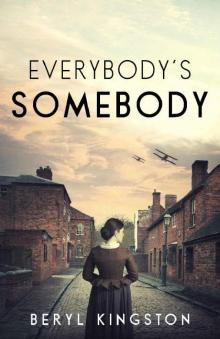 Everybody's Somebody
Everybody's Somebody Sixpenny Stalls
Sixpenny Stalls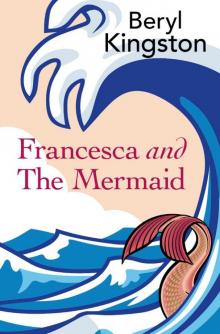 Francesca and the Mermaid
Francesca and the Mermaid Avalanche of Daisies
Avalanche of Daisies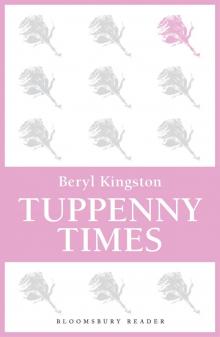 Tuppenny Times
Tuppenny Times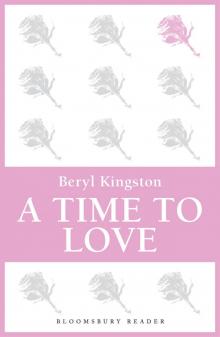 A Time to Love
A Time to Love Octavia's War
Octavia's War Gemma's Journey
Gemma's Journey London Pride
London Pride Gates of Paradise
Gates of Paradise Octavia
Octavia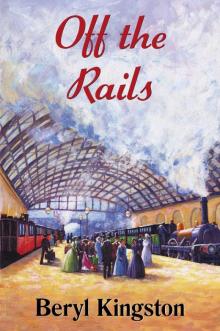 Off the Rails
Off the Rails Maggie's Boy
Maggie's Boy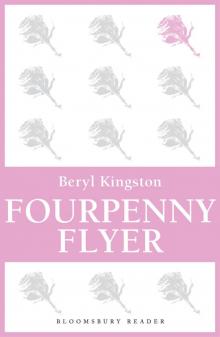 Fourpenny Flyer
Fourpenny Flyer